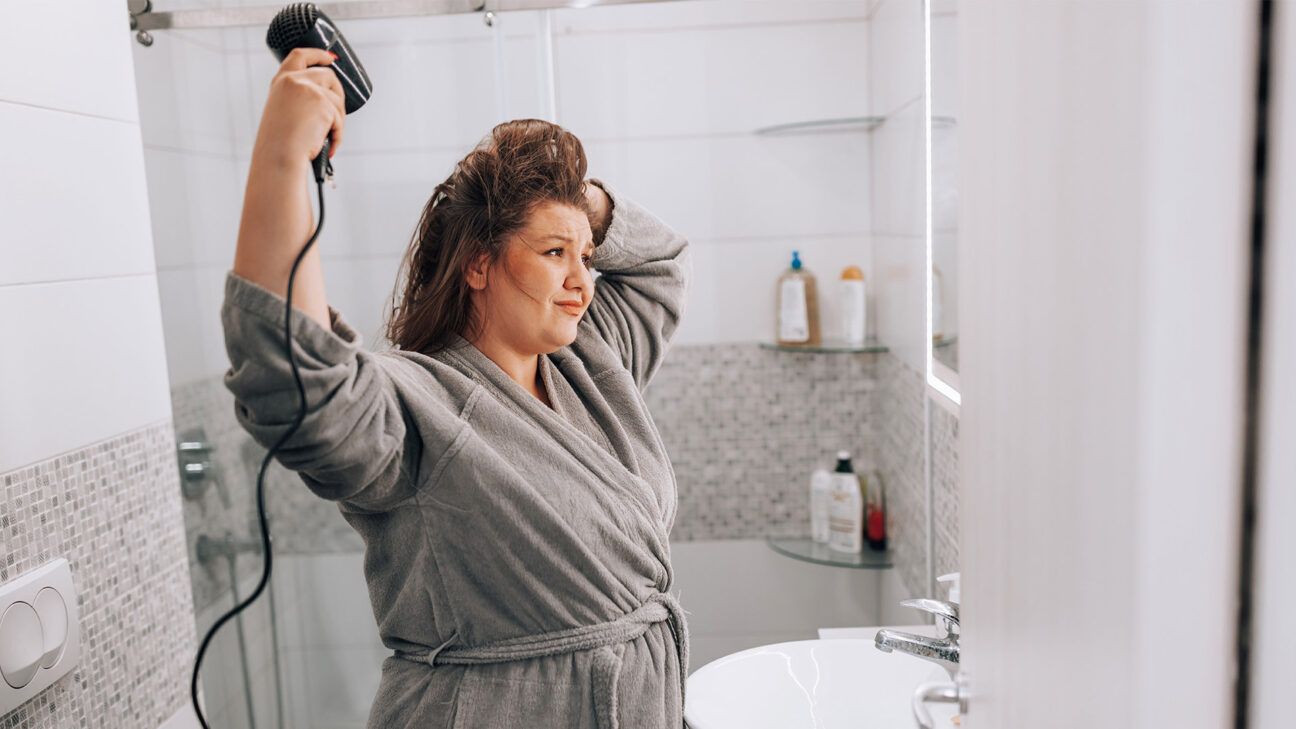
- Hair training, a practice that involves washing your hair infrequently, has grown popular online.
- Proponents say hair training improves hair and scalp health and, over time, can reduce how often you need to wash your hair.
- However, there is no scientific evidence to support these claims and experts say hair training can lead to thinning, hair loss, and scalp infections.
- There is no one-size-fits-all when it comes to how often you should wash your hair. Creating a tailored plan is best.
How frequently you wash your hair is often a matter of preference.
However, a popular trend on TikTok is claiming that by going long periods of time without washing your hair, you can improve the condition of both your hair and scalp.
The practice is known as “hair training,” however, there is no evidence to support it as a hack for improving hair health.
On TikTok, influencers are sharing videos of their hair training journey, with many claiming not to have washed their hair in weeks.
During the process, you are encouraged to gradually increase the length of time between hair washes, working up to a 30-day gap.
While some say it’s improved the condition of their locks and enhanced shine, experts say the practice can lead to hair thinning, hair loss, and scalp issues.
“The idea behind hair training is that you ‘train’ your hair and indeed your scalp to only need to be washed occasionally — for some this will mean a week, for other advocates of the practice it means a month,” explains Sam Carpenter, global educator at haircare company EIDEAL.
“It stems from the belief that chemicals such as sulfates (present in many haircare products) dry out the strands which causes an overproduction of natural oils and that by training the hair and scalp, it will return to its natural, healthy state,” he explains.
However, if you do not wash your hair regularly, Carpenter says the
Research appears to back this up, with one
It’s not just your hair that could be affected, but your scalp too.
“For me, the biggest issue with not washing hair regularly is that you could be at risk of developing seborrheic dermatitis, a common skin condition that primarily affects the scalp and is characterized by red, itchy, and inflamed skin,” explains Dr. Fariha Anwar, aesthetic doctor at Euromed Clinic Dubai.
That’s not all. Not washing your hair allows yeast to thrive on your scalp as well.
While infrequent hair washing is not a direct cause of seborrheic dermatitis, Anwar says if you don’t wash your hair regularly, excess sebum can accumulate on the scalp, creating an environment where the condition is more likely to develop.
What’s more, seborrheic dermatitis creates an itchy scalp and the scratching can also lead to hair loss in some cases.
It probably won’t come as much of a surprise that how often you should wash your hair really comes down to the individual. Some people will find their hair gets dirty and oily more quickly than others.
Carpenter says discovering your ideal frequency is about understanding your scalp health and what you are trying to achieve, for example wanting to wash your hair less often or simply balancing your scalp health.
“If you have fine hair, it may require daily washing to stop it from looking limp. Equally, if you use lots of styling products, you will need to wash it more often to reduce product buildup,” he says.
If you have very oily hair, you might want to wash it every day according to the American Academy of Dermatology Association, however, this will be too often for many people.
If you’re unsure, looking at your hair and scalp for signs of buildup can help you decide if it’s time for a wash.
The type of product you use to wash your hair is not only a matter of personal preference, but it will also depend on your hair type.
“Choosing what you wash your hair and treat your scalp with can be confusing,” Carpenter points out.
“It all comes down to your personal scalp health, hair type, and condition and this can easily be identified by asking your hairdresser.”
Once you’ve identified your hair type, Carpenter says you’ll need to match your condition with a product that has the correct active ingredients to improve or treat what’s going on.
Dry, damaged hair will respond well to ingredients like keratin and coconut oil. If your hair is curly, look for products containing glycerin and seed oils.
And if your hair is on the oily side? Stick with natural ingredients like tea tree oil.
Other ways you can improve your hair and scalp health without skipping the shower?
“Regular brushing will ensure that oils are evenly distributed along the entire hair fiber,” says Carpenter.
How often you need to wash your hair is highly individual – but hair training is unlikely to yield positive results for most people. As well as damaging hair health, it could make your hair look and smell dirty.
If you really want to improve your hair health, using hot styling tools less frequently might be a better way to go.
“Detoxing from hot hair tools and removing products that contain sulfates will help reduce damage,” says Carpenter.









